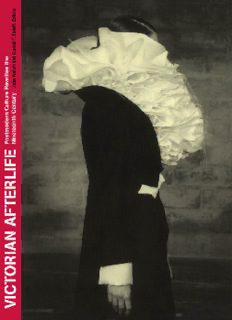
Victorian Afterlife: Postmodern Culture Rewrites the Nineteenth Century PDF
Preview Victorian Afterlife: Postmodern Culture Rewrites the Nineteenth Century
V i c t o r i an a f t e r l i fe This page intentionally left blank John Kucich and Dianne F. Sadoff, Editors V i c t o r i an V i c t o r i a n a f t e r l i f e a f t e r l i fe Postmodern Culture Rewrites the Nineteenth Century University of Minnesota Press Minneapolis / London Lines from "A Postcard from the Volcano," by Wallace Stevens, from The Palm at the End of the Mind, edited by Holly Stevens (New York: Vintage Books, 1972), page 127, are reprinted by permission of Alfred A. Knopf, Inc. Copyright 2000 by the Regents of the University of Minnesota All rights reserved. No part of this publication may be reproduced, stored in a retrieval system, or transmitted, in any form or by any means, electronic, mechanical, photocopying, recording, or otherwise, without the prior written permission of the publisher. Published by the University of Minnesota Press 111 Third Avenue South, Suite 290 Minneapolis, MN 55401-2520 http://www.upress.umn.edu Library of Congress Cataloging-in-Publication Data Victorian afterlife : postmodern culture rewrites the nineteenth century / John Kucich and Dianne F. Sadoff, editors, p. cm. Includes bibliographical references and index. ISBN 0-8166-3323-1 (alk. paper)—ISBN 0-8166-3324-X (pbk. : alk. paper) 1. English literature—19th century—History and criticism—Theory, etc. 2. Literature and history—Great Britain—History—19th century. 3. Literature and history—Great Britain—History—20th century. 4. Great Britain— History—Victoria, 1837-1901—Historiography. 5. English fiction—Film and video adaptations. 6. Great Britain—Civilization—19th century. 7. Great Britain—Civilization—20th century. 8. Postmodernism. I. Kucich, John. II. Sadoff, Dianne F. III. Title. PR461 .V5 2000 820.9'008—dc21 00-008492 Printed in the United States of America on acid-free paper The University of Minnesota is an equal-opportunity educator and employer. 11 10 09 08 07 06 05 04 03 02 01 00 10 9 8 7 6 5 4 3 2 1 We approach the final stage in the conditions of historical learning. Lord Acton, Lectures on Modern History (1895) One of the most popular genital piercings today, the Prince Albert—in which a ring is inserted through the urethra and out the underside of the head of the penis—is named after Queen Victoria's consort. The prince reportedly got the piercing to tether his penis to his leg, in order to fit into the tight pants that were the fashion of the day. Marilee Strong, A Bright Red Scream: Self-Mutilation and the Language of Pain (1998) The one duty we owe to history is to rewrite it. Gilbert, The Critic as Artist, by Oscar Wilde (1890) This page intentionally left blank contents Introduction Histories of the Present Dianne F. Sadoff and John Kucich ix myst if i cations Modernity and Culture, the Victorians and Cultural Studies John McGowan 3 At Home in the Nineteenth Century: Photography, Nostalgia, and the Will to Authenticity Jennifer Green-Lewis 29 The Uses and Misuses of Oscar Wilde Shelton Waldrep 49 Being True to Jane Austen Mary A. Favret 64 A Twentieth-Century Portrait: Jane Campion's American Girl Susan Lurie 83 Display Cases Judith Roof 101 engagements Found Drowned: The Irish Atlantic Ian Baucom 125 The Embarrassment of Victorianism: Colonial Subjects and the Lure of Englishness Simon Gikandi 157 Hacking the Nineteenth Century Jay Clayton 186 Queen Victoria and Me Laurie Langbauer 211 Sorting, Morphing, and Mourning: A. S. Byatt Ghostwrites Victorian Fiction Hilary M.Schor 234 Asking Alice: Victorian and Other Alices in Contemporary Culture Kali Israel 252 Specters of the Novel: Draculaand the Cinematic Afterlife of the Victorian Novel Ronald R.Thomas 288 Postscript Contemporary Culturalism: How Victorian Is It? Nancy Armstrong 311 Contributors 327 Index 331 Introduction Histories of the Present Dianne F. Sadoff and John Kucich A scene from Clueless, Amy Heckerling's campy 1995 film version of Emma, handily identifies the crisis of postmodern historiography that Victorian Afterliaddresses. From the backseat of a car, Cher watches Josh and his intel- lectual poseur girlfriend critique their university creative-writing class. "Like Hamlet said," the long-haired, beret-wearing girlfriend proclaims, "to thine own self be true." Cher pipes up: "[Hamlet] didn't say that. That Polonius guy did." Girl laughs: "I think I remember Hamlet accurately"; Cher: "Well, I remember Mel Gibson accurately."1 Tongue in cheek, Clueless follows Cher in undoing literary history and placing twentieth-century cultural icons in the position of textual originals. Heckerling's allegorical scene, in which the 19905 meet the 19505, flaunts a manic historical insouciance, like Cher's, that foregrounds the dysfunctions of cultural memory in the construction of post- modern identity. What leverage does the concept of periodization provide for cultural self-awareness in this film? Heckerling suspends the question by charming us with a heroine who has no sense of history at all. Named after a "great singer . . . of the past who now does infomercials," Cher lives in a Beverly Hills mansion with pillars that date "all the way back from 1972"; when asked if she likes Billie Holliday, Cher replies, with a teasing glance at the camera, "I love him." Heckerling speaks to and seemingly for Cher's contemporaries in her audience, who presumably have no sense of how a historical moment represents itself to itself. At the same time, Heckerling trumps such ignorance by burying within her film enigmatic "clues" about ix
Description: